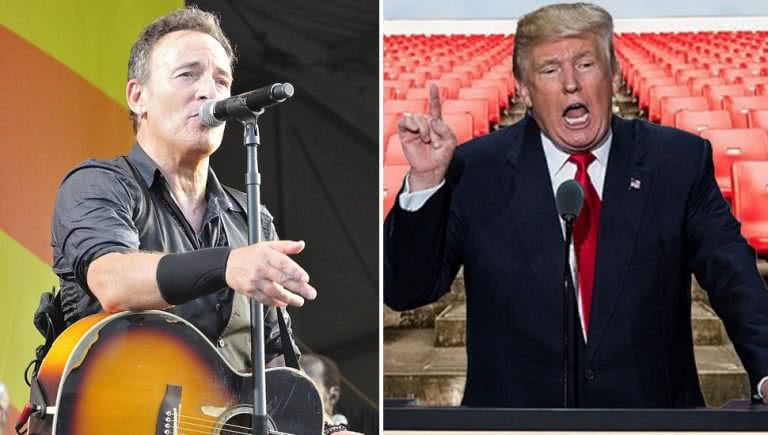Bruce Springsteen Opens Manchester Tour with Blistering Critique of Trump Administration
A Tour Kickoff Charged with Politics and Passion
When Bruce Springsteen took the stage in Manchester to launch the latest leg of his world tour, fans expected to hear his signature blend of heartfelt storytelling and high-energy rock. What they didn’t fully anticipate was a fiery political statement that would reverberate far beyond the stadium. In front of a sold-out crowd, Springsteen denounced the Trump administration as “corrupt, incompetent, and treacherous,” sparking cheers, debate, and a wave of media coverage worldwide.
Springsteen’s words weren’t a casual aside between songs; they were a deliberate, impassioned address. The moment underscored his long-standing role as more than just a rock legend — he has always been a cultural voice willing to challenge political power when he feels it’s necessary.

The Setting: Manchester as a Global Stage
The choice of Manchester as the opening city for this segment of the tour was symbolic. Known for its rich music history and working-class roots, Manchester provided an ideal backdrop for Springsteen’s message. From the first chord to the last encore, the night was a blend of celebration and confrontation — a reminder that music can be both entertainment and activism.
As the crowd sang along to classics like Born to Run and The Rising, the political undertones became clear. Springsteen positioned his music as a rallying cry, connecting personal struggles to larger societal battles.
A History of Speaking Out
Springsteen’s Manchester remarks were not an isolated incident. Throughout his career, he has been vocal about issues such as economic inequality, veterans’ rights, and social justice. His criticism of Donald Trump dates back to the 2016 presidential campaign, when he called Trump “a threat to democracy” and warned about the dangers of populist authoritarianism.
Over the years, Springsteen has used interviews, concerts, and even entire albums to address the political climate. For example, his 2002 album The Rising, while rooted in the aftermath of 9/11, also explored themes of unity and resilience in times of national division. His recent EP Land of Hope & Dreams echoes that sentiment, mixing live recordings with his commentary on the state of American democra

Fan and Media Reaction
Reactions to Springsteen’s Manchester statement were swift and polarized. Within minutes, clips of his speech circulated on social media, trending across multiple platforms. Supporters praised him for speaking truth to power, calling the moment “vintage Bruce” — bold, authentic, and unafraid.
Critics, however, argued that music concerts should remain apolitical, accusing Springsteen of alienating fans with different political views. Some Trump supporters even called for boycotts, while others dismissed the comments as grandstanding.
The media response was equally divided. Outlets sympathetic to Springsteen’s views highlighted the importance of artists using their platform to raise awareness. Conservative commentators, meanwhile, accused him of leveraging fame for political gain.
Trump’s Counterattack
It didn’t take long for Donald Trump to respond. On his social media platform, the former president fired back, labeling Springsteen “a washed-up singer” and “stupid as a rock.” The exchange intensified the story, ensuring it remained in the headlines for days. This public spat added another chapter to the already tense history between the two men.
For Springsteen, the criticism seemed unlikely to deter him. As he has said in past interviews, his responsibility as an artist is to be honest, even if it makes some people uncomfortable.
The Broader Context: Art and Activism
Springsteen’s comments fit into a larger conversation about the role of artists in political discourse. Should musicians stick to music, or is it their duty to engage with pressing social issues? History offers plenty of examples — from Bob Dylan to U2 — of artists whose work is inseparable from their activism.
In Springsteen’s case, his message in Manchester was consistent with his brand of blue-collar rock, which often champions the underdog and challenges authority. His songs tell stories of ordinary people facing extraordinary hardships, making political engagement a natural extension of his art.
Impact on the Tour
Far from dampening enthusiasm, the controversy may have actually boosted interest in the tour. Ticket sales for upcoming shows reportedly saw a spike following the Manchester performance. Fans appear eager to witness not just the music, but the charged atmosphere Springsteen brings to the stage.
The setlist itself has evolved to reflect his current mood, with politically resonant tracks like Rainmaker making rare appearances. These choices suggest that Springsteen is deliberately shaping the tour as both a musical and political statement.
What Comes Next
As the tour moves across Europe and eventually back to the United States, observers will be watching to see whether Springsteen continues to make political declarations. Given his track record, it’s unlikely he will stay silent.
The release of Tracks II: The Lost Albums later this year — a collection of previously unreleased material spanning decades — may also carry political weight. Springsteen has hinted that some of these songs reflect moments of social and political upheaval in America’s recent history.

A Legacy of Truth-Telling
Bruce Springsteen’s Manchester speech was more than a headline-grabbing sound bite; it was the latest entry in a lifelong commitment to speaking truth as he sees it. For his fans, it reaffirmed why they’ve followed him for decades — not just for the music, but for the moral clarity and courage he brings to the stage.
Whether one agrees with his politics or not, there’s no denying that Springsteen continues to embody the role of the artist as a witness to history, unafraid to challenge those in power. In Manchester, under the bright lights and roaring applause, the “Boss” once again proved that rock and roll can still shake the foundations — both musical and political.